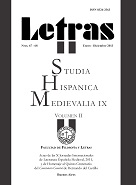Por favor, use este identificador para citar o enlazar este ítem:
https://repositorio.uca.edu.ar/handle/123456789/4587| Campo DC | Valor | Lengua/Idioma |
|---|---|---|
| dc.contributor.author | Hamlin, Cinthia María | es |
| dc.coverage.spatial | EDAD MEDIA | es |
| dc.date.accessioned | 2019-06-01T18:41:33Z | - |
| dc.date.available | 2019-06-01T18:41:33Z | - |
| dc.date.issued | 2013 | - |
| dc.identifier.citation | Hamlin, Cinthia M. “La traducción de la Divina Comedia de Villegas: problemas de datación y filiación de testimonios” [en línea]. Letras, 67-68 (2013). Disponible en: https://repositorio.uca.edu.ar/handle/123456789/4587 | es |
| dc.identifier.issn | 0326-3363 | - |
| dc.identifier.uri | https://repositorio.uca.edu.ar/handle/123456789/4587 | - |
| dc.description.abstract | Resumen: En 1515 se difunde en Burgos la primera traducción impresa de la Divina Comedia, a cargo de Pedro Fernández de Villegas, traducción bastante olvidada y poco estudiada por la crítica. El único manuscrito que se conserva (ms. B2183 de la Hispanic Society of America) es, según la descripción de Dutton (1982: 4659), autógrafo, conclusión a la que llega basándose en la reiteración de la tapa. Faulhaber (1983: 516-18), por su parte, data al manuscrito a fines del XV y asume que fue el texto fuente usado por la imprenta en 1515. Los datos otorgados por estos estudiosos han sido poco problematizados, tal vez por la falta de un estudio minucioso que aborde el manuscrito y sus problemas ecdóticos. En el presente trabajo intentaremos, por un lado, redefinir el terminus a quo de la traducción, basándonos en el estudio del contexto histórico de producción y en alusiones del mismo prólogo y de ciertos pasajes del comentario que, en el impreso, se encuentra envolviendo cada copla traducida. Por otro lado, a partir del cotejo entre los versos del manuscrito y el impreso, enfocándonos especialmente en los versos que aparecen enmendados en el primero, intentaremos problematizar la relación de filiación que se ha dado por sentada entre las dos versiones. A manera de adelanto, podríamos decir, por un lado, que la traducción no se podría haber empezado antes de 1502 y, por el otro, que el texto que nos transmite el manuscrito correspondería a una segunda etapa en el proceso de traducción, posterior a la del texto que nos transmite el impreso | es |
| dc.description.abstract | Abstract: The first printed translation of the Divine Comedy, which was composed by Pedro Fernández de Villegas and circulated in Burgos in 1515, is a rather forgotten text that has not been much studied by the critics. The only conserved manuscript (ms. B2183, Hispanic Society of America) is considered autograph according to Dutton, who arrives at this conclusion based on the inscription in its cover. Moreover, Faulhaber dates this manuscript towards the end of the fifteenth century, and assumes that this was the source text used for the printing. The data provided by these critics has not been much discussed, possibly due to the lack of a thorough study of the manuscript and its ecdotic problems. In the present study we will try, on the one hand, to redefine the terminus a quo of the translation, basing our work on the study of the historical context of production and on some references found in the prologue as well as in certain passages of the commentary that, on the printed version, surrounds every stanza. On the other hand, through a comparison between the verses of the manuscript and the printed version, especially those verses that has been emended, we will try to discuss the assumed filiation bond between both texts. As a preliminary conclusion we may state that, on the one hand, the translation cannot be dated before 1502; on the other, the text transmitted in the manuscript corresponds to a second phase in the translation process, whereas the text transmitted in the printed version to a first | es |
| dc.description.abstract | Contenido: Studia Hispánica Medievalia IX: volumen II: Actas de las X Jornadas Internacionales de Literatura Española Medieval y Homenaje al Quinto Centenario del Cancionero General de Hernando del Castillo. Buenos Aires, Universidad Católica Argentina, 24-26 de agosto de 2011 | es |
| dc.format | application/pdf | es |
| dc.language.iso | spa | es |
| dc.publisher | Universidad Católica Argentina. Facultad de Filosofía y Letras. Departamento de Letras | es |
| dc.rights | Acceso Abierto | es |
| dc.rights.uri | https://creativecommons.org/licenses/by-nc-sa/4.0/ | es |
| dc.source | Letras, nº 67-68, 2013 | es |
| dc.subject | TRADUCCION | es |
| dc.subject | DIVINA COMEDIA | es |
| dc.subject | VERSIONES | es |
| dc.subject | MANUSCRITOS | es |
| dc.subject | IMPRESOS | es |
| dc.title | La traducción de la Divina Comedia de Villegas: problemas de datación y filiación de testimonios | es |
| dc.type | Artículo | es |
| uca.path | Letras|2013 nº 67-68 | es |
| uca.disciplina | LITERATURA | es |
| uca.filename | /home/data-uca-generic/folder_generic/letras-67-68/traduccion-comedia-villegas/metadata.xml | es |
| uca.issnrd | 1 | es |
| uca.affiliation | Fil: Hamlin, Cinthia María. Universidad de Buenos Aires; Argentina | es |
| uca.affiliation | Fil: Hamlin, Cinthia María. Consejo Nacional de Investigaciones Científicas y Técnicas; Argentina | es |
| uca.affiliation | Fil: Hamlin, Cinthia María. Instituto de Investigaciones Bibliográficas y Crítica Textual. Seminario de Edición y Crítica Textual; Argentina | es |
| uca.orden | 09 | es |
| uca.version | publishedVersion | es |
| item.fulltext | With Fulltext | - |
| item.languageiso639-1 | es | - |
| item.grantfulltext | open | - |
| Aparece en las colecciones: | LETRAS - 2013 nro. 67-68 | |
Ficheros en este ítem:
| Fichero | Descripción | Tamaño | Formato | |
|---|---|---|---|---|
| traduccion-comedia-villegas.pdf | 72,48 kB | Adobe PDF |  Visualizar/Abrir |
Visualizaciones de página(s)
192
comprobado en 30-abr-2024
Descarga(s)
62
comprobado en 30-abr-2024
Google ScholarTM
Ver en Google Scholar
Este ítem está sujeto a una Licencia Creative Commons

